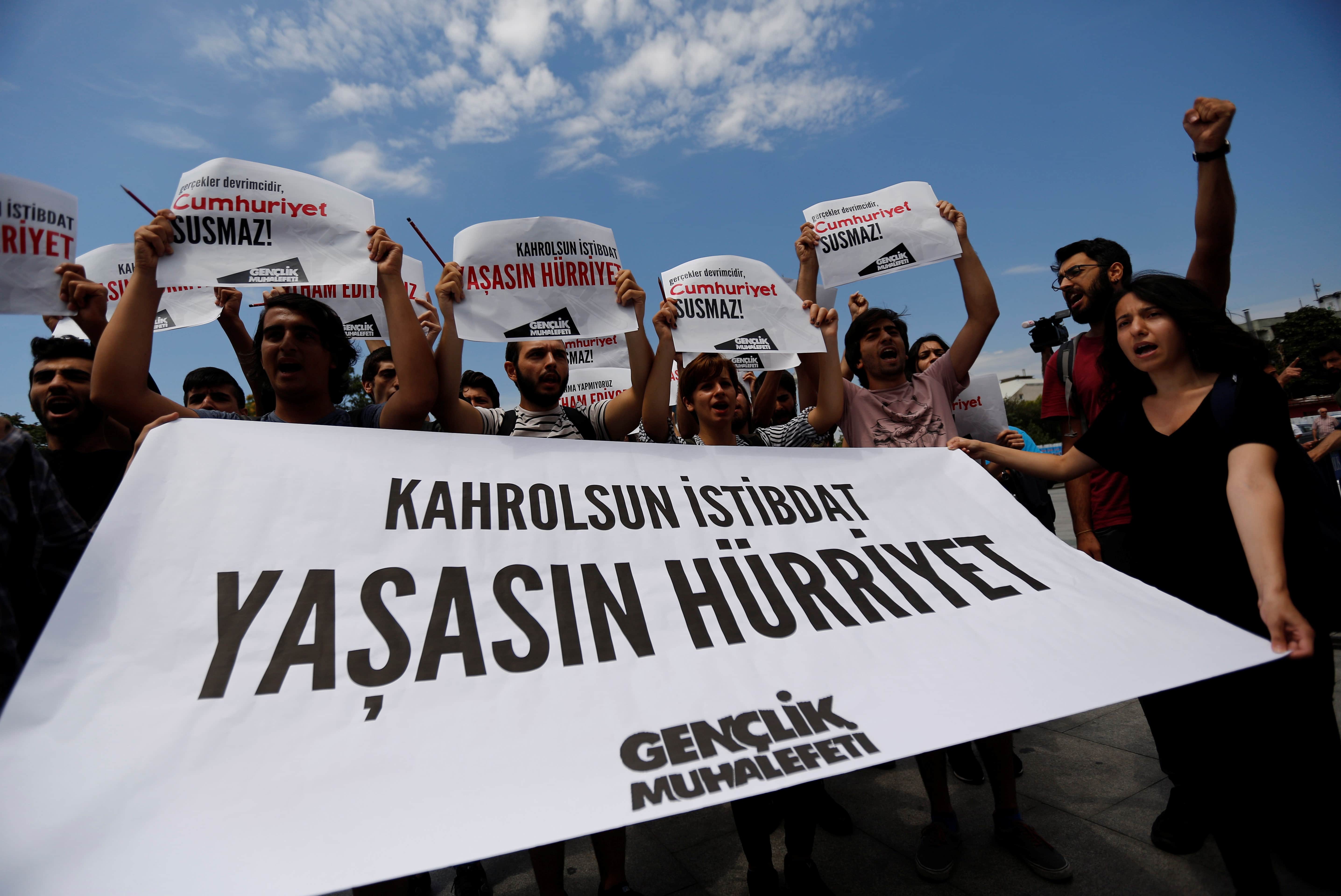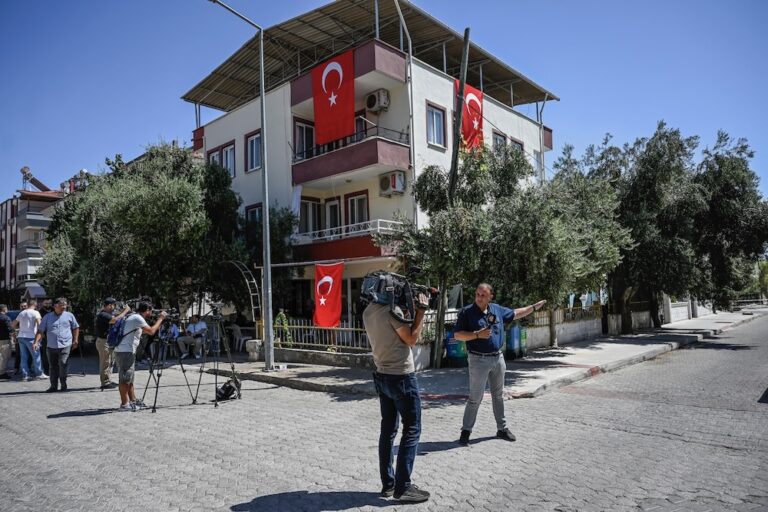"The government rules the courtroom, not the law. Talking about justice in a courtroom feels like punching against a solid wall of evil. Your mind and soul hurt when you have to defend yourself against such slander."
This statement was originally published on ipi.media.org on 4 September 2017.
The week of July 24, 2017 we witnessed the start of one of the most ridiculous trials of all time.
It was the first hearing of the Cumhuriyet case, which, by the end of the week, led to the release of seven imprisoned employees of the daily. But Cumhuriyet Editor-in-Chief Murat Sabuncu, IPI Executive Board Member and journalist Kadri Gürsel, investigative journalist Ahmet Şık and Cumhuriyet Foundation Executive Board Director and lawyer Akın Atalay were sent back to prison.
They are accused of changing the newspaper’s editorial policy to support Fethullah Gülen’s movement, which the government accuses of launching the July 2016 coup attempt, as well as the Kurdistan Workers’ Party (PKK) and the Revolutionary People’s Liberation Party/Front (DHKP-C).
The prosecutor in charge of the investigation was himself under suspicion of being a member of the Gülen community! In order to prove the opposite, he did his best to make “criminals” out of our colleagues.
Who would believe that Kadri Gürsel would support the putschist Gülen movement? While government officials were praising Gülen every day, Kadri used to warn about Gülen’s systematic penetration of the state. In Kadri’s words, such an accusation simply “defies logic”.
The same goes for Ahmet Şık. Early this decade, he wrote a book on Gülen, titled The Imam’s Army, warning about the dangerous partnership between Gülen and [then-Prime Minister, now President, Recep Tayyip] Erdoğan. As a consequence, he had to spend a year in prison beginning in 2011.
Because he kept reminding everyone that today’s enemies were yesterday’s partners in crime, he ended up in prison again. He was the only one the prosecutors could not accuse of being a Gülenist – instead they accused him of supporting other outlawed organisations.
I approached the courtroom that day asking myself why the judges would release them now, after having imprisoned them for almost nine months on fabricated charges. I was right to ask that question.
Access to justice
I had to push to get the 6’4″-tall Steven Ellis, International Press Institute (IPI) director of advocacy and communications, through the crowd of lawyers, journalists and others jamming the entrance to the courtroom. Steven, as patient as he is, managed to get in. IPI Executive Director Barbara Trionfi, as determined as she is, had to wait elegantly in the crowd. It was damn hot in there, maybe 40 Celsius, and I believe we may have lost some weight waiting to get in.
The courtroom was packed. The 11 imprisoned Cumhuriyet employees were already sitting, along with other “suspects” from the daily, encircled by two dozen gendarmes – as if they were vicious criminals!
The newspaper’s editor in chief, Murat Sabuncu, had to postpone his defence, as the visuals he was going to use in the courtroom were seized by gendarmes as he was leaving the prison! So, Kadri had to make the opening act.
While Kadri refuted all the accusations against him one by one, I realized the gravity of the situation once again. So many baseless accusations, all fabricated deliberately to bring charges against him and the others.
The indictment accused most of them of contacting Gülen suspects. But some were no suspects at all. Others called or texted Kadri, but he had not returned the calls or replied to the messages.
Who cares? Kadri reminded the judges that he was a journalist; anyone could call him or he could call anyone, including most controversial figures if necessary. He said: “Journalism is not a crime!”
I pictured a neon sign blinking on the wall of the courtroom repeating this sentence: “Journalism is not a crime! Journalism is not a crime! Journalism is not…”
I don’t know if it would change anything though. For these judges, journalism means obedience.
An unsupported indictment
I asked myself: “Even though they were biased against our colleagues, how could a shabby indictment like this based on fake or no evidence at all not bother them?”
An example: A parquet layer who once worked for Akın Atalay has a son. This son once dined in a restaurant owned by an alleged Gülenist. Although Atalay was not aware of this man’s existence until the day he saw the indictment, this was “proof enough” of his link to Gülen, according to the prosecutor.
Another example: The daily’s ombudsman, Güray Öz, also could not have known that the owner of the restaurant where he used to order delicious pitas would pop up as a suspected Gülenist in the indictment – an allegation that was not true, by the way. But, again, who cares?
Another one: The board members of Cumhuriyet were accused of publishing ads from a Gülenist bank. But the judiciary turned a blind eye to the fact that these ads were published after the bank was already in the hands of a government-appointed trustee. This fact, revealed by Akın Atalay during his defence, was not deemed significant by the judges.
Gülenists in the police and the judiciary worked hard back in 2010 to manufacture fake evidence used to imprison journalists. It took years to prove that such documents were falsified.
Today, though, they do not even bother with that pretence: the crime is committed openly. The judiciary does not care, even if the indictment has no legal basis. It is a matter of fulfilling orders at any cost. Any prosecutor or judge deciding otherwise may be discharged the next day.
The government rules the courtroom, not the law. Talking about justice in a courtroom feels like punching against a solid wall of evil. Your mind and soul hurt when you have to defend yourself against such slander.
That’s why Ahmet Şık stressed that he was declining to offer a defence, but instead presenting his own indictment of the government and its judiciary.
“This is not a statement for my defence, because I consider doing so as an insult to journalism and to the ethical values of my profession,” he told the court.
Once again: “Journalism is not a crime!”
In his testimony Ahmet told it all: the historical background of today’s purge against opponents of the government and Cumhuriyet daily, unanswered questions about the July 2016 coup attempt, Erdoğan’s role in paving the way for Gülen to capture the state. When Ahmet finished his testimony, a big round of applause erupted in the courtroom. Some were in tears and I was one of them.
A brave face
Today, I talked to the wives of Ahmet, Kadri and Murat. They were all determined to say of their husbands: “He is fine. Yes, we are fine.”
Kadri’s wife, Nazire Kalkan, said: “They already served a sentence without having been convicted. Why not release them immediately?” Yonca Verdi, Ahmet’s wife, told me that one of the contact visits they were supposed to have was cancelled, preventing them from meeting two weeks in row. Murat/s wife, Eylem Türk Sabuncu, said that Murat is not only worried about himself.
The only positive development since the trial is the lifting of restrictions on their meetings with lawyers. Before, these meetings were limited to one hour, once a week, and were conducted under surveillance.
Now, the lawyers can visit them every day. Turkey has until Oct. 2, 2017 to submit a defence to the European Court of Human Rights (ECHR) in Strasbourg [in response to the defendants’ claims that holding them in pre-trial detention violates their rights].
The government probably thinks that this partial lifting of restrictions and the release of seven of the Cumhuriyet employees will help to defend its cause at the ECHR. I personally have my doubts.
I remember my last phone conversation with Kadri on the day he was arrested. He was at the newspaper.
“Now I am heading back home,” he said. “They came to my home with a search and arrest warrant. I’ll go and we’ll see what happens.”
What has happened since is only injustice.
In the packed courtroom, we were able to exchange smiles and a few words, which made us feel better. When they were leaving the court, we could wave to each other and hold hands for a moment, saying: “See you in September!” I saw in Kadri’s eyes how happy he was to see friends, including Barbara and Steven.
The next hearing will be on Sept. 11, this time in the huge prison complex in Silivri, on the outskirts of Istanbul, where they are being held.
I know that they are waiting for that day to see us again and to punch stronger against the wall of evil in our presence. As Ahmet said: “What scares the tyrant most is courage.”
We may not have high hopes for their immediate release. But we do have the courage to struggle for freedom.
Banu Güven is a journalist in Turkey. The views expressed in this article are those of the author and may not necessarily represent the views of IPI.



